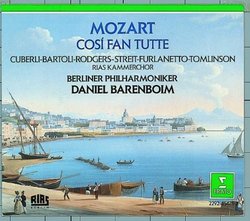| All Artists: Wolfgang Amadeus Mozart, Daniel Barenboim, Berliner Philharmoniker, RIAS-Kammerchor, Cecilia Bartoli, Lella Cuberli, Joan Rodgers, Kurt Streit, Ferruccio Furlanetto, John Tomlinson Title: Mozart - Cos� fan tutte / Cuberli � Bartoli � Rodgers � Streit � Furlanetto � Tomlinson � Berlin Phil. � RIAS � Barenboim Members Wishing: 0 Total Copies: 0 Label: Erato Release Date: 6/25/1991 Album Type: Box set Genre: Classical Styles: Opera & Classical Vocal, Historical Periods, Classical (c.1770-1830) Number of Discs: 3 SwapaCD Credits: 3 UPCs: 022924547522, 022924547522 |
Search - Wolfgang Amadeus Mozart, Daniel Barenboim, Berliner Philharmoniker :: Mozart - Cos� fan tutte / Cuberli � Bartoli � Rodgers � Streit � Furlanetto � Tomlinson � Berlin Phil. � RIAS � Barenboim
CD Details |
CD ReviewsA superb recording! Kendall Hodder | 02/04/1999 (5 out of 5 stars) "Though there are plenty of great recordings of this great opera, this recording is really very, very good. Best of all is the glorious Fiordiligi of Lella Cuberli, a most beautiful soprano. Cecilia Bartoli is her perfect sister, both enjoy and makes us enjoy their work. Even among classic sets, this is really worth having." Better with every listen Kendall Hodder | Boston, MA USA | 12/13/1999 (5 out of 5 stars) "Wonderful listening experiences await! This CD gets better and better each time I listen. Aside from the wonderful Cuberli and Bartoli, the most impressive performance comes from tenor, Kurt Streit. It is very refreshing to hear his lovely, lyric tenor voice float sweetly through his first aria. The world is inundated lately with the three heavy, love-to-hear-themselves-above-everything-else tenors. Streit is a star in the making. His voice is worth the price of the CD alone." Good but not 5 stars V. Stasov | 05/27/2003 (4 out of 5 stars) "This is a good effort, but I have to disagree with the 5 star rating. Hate to be a naysayer but there are a few problems with this set which one should be aware of:1. The 3 disc set does not contain the complete opera. There is a duettino with Guglielmo and Ferrando in Act I ("Al fato dan legge") along with its preceding recitative ("Non piagere,idol mio") which was omitted. In the Act II finale, a lovely quartet with the 4 main singers should be present ("Come par che qui prometta"), between 2 renditions of "Benedetti i doppi coniugi" by the chorus. Barenboim omits these sections, and the printed libretto supplied with the discs also omits them. Since there should have been enough space on 3 CDs to include them I am a bit mystified as to why. I thought I was getting the whole opera!2. My other complaints apply to artistic choices and therefore are entirely subjective. When I bought this set a few years ago I was a bit disappointed because I had recently seen a live production, and the discs did not do justice to my memory of the music. I could not pin down the problems until I recently bought John Eliot Gardiner's version on DVD. That version is great - fully matching my memories of live performances, and contrasting it with the Barenboim version I can say the following: - Barenboim's tempos are somewhat ponderous during Act I which slows things down at a time when things should really be taken quickly and lightly. - Accompaniment by the entire Berlin Philharmonic on modern instruments - this is somewhat overkill for opera accompaniment; where Gardiner subtly accentuates the singers with his smaller ensemble, Barenboim can't really do that without being overwhelming. - Barenboim seems to have chosen the singers for the contrast between their voices - each is readily distinguishable, a strength on a recording but in Cosi the ensemble singing is better suited to voices with more similar range. Also the lack of a live audience I think detracts a bit from the singers' involvement in the role - they seem intellectually engaged but not viscerally so; Despina being an exception. The singers are always in the same location on the recording, so there is no sense of movement or action: female leads to the left, male on the right. On the plus side, there are no stage noises.3. Good things: the recording quality is good and the individual singers are talented. Cecilia Bartoli struts her stuff with excellent renditions of Dorabella's arias. Streit and Rodgers are very good in their roles as well. Cuberli is fine but I prefer Roocroft in the Gardiner version; Cuberli has perhaps a slightly richer tone to her voice but Roocroft is more precise and better able to define individual notes in high fast passages. Contrast their versions of "Come scoglio" and their ensemble singing and you'll see what I mean.Overall, not bad and individual performances are worth listening to; but it's not my preferred version."
|

